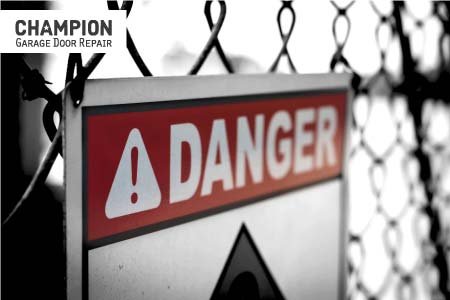There are many repair tasks around your home that you can easily attend to on your own with a few simple tools and little to no knowledge. However, repairing a garage door might not be one of those projects you take on yourself. Here are the key reasons why garage door repairs can be more than meets the eye and why you may want to avoid them.
1. Complexity and Specialized Knowledge
While garage doors may seem like simple mechanical objects, an overhead garage door system comprises numerous interrelated parts supporting the door, including springs that generate a high level of torque to balance its weight. Attempting to tamper with these mechanisms without following proper safety procedures and attempting repairs without adequate knowledge can lead to mistakes, potentially resulting in costly repairs or the need for replacement rather than a simple fix. Additionally, repairing or modifying garage door components without a proper understanding of their interactions can lead to structural issues, compromising the door’s integrity and making it prone to failure.
2. Inadequate Diagnosis
In many cases, identifying the root cause of a garage door issue requires expertise. A misdiagnosis may lead to addressing the wrong problem, resulting in ineffective repairs and potentially causing further damage.
3. Manufacturer’s Specifications
Garage door manufacturers provide specific guidelines for maintenance and repairs. DIY repairs might not adhere to these specifications, potentially compromising the garage door’s performance.
4. Safety Risks and Personal Injury
Due to the heavy weight of garage doors, attempting repairs while tampering with the wrong parts can lead to the garage door accidentally detaching from the torsion assembly or lift system, causing it to come off the tracks and slam down to the ground.

This scenario poses a significant risk of serious injury to people in the vicinity and potential damage to the door’s sections, property, vehicles, and other items stored in the garage. Additionally, it increases the risk of electric shock and short circuits. Garage doors are subject to stringent regulations, and DIY repairs might not comply with these regulations, leading to legal consequences and liability issues in case of accidents.
5. Specialized Tools and Equipment
Repairing a garage door often requires special tools that make the job safer, easier and effective. These tools include designated winding bars, wrenches, and various power tools that are not commonly used in other types of home repairs. Using the right tools not only facilitates the repair process but also minimizes the risk of personal injury and damage to the garage door.
6. Reoccurring Malfunctions
Attempting garage door repairs without experience may result in repeated breakages of both the garage door and its equipment. For instance, if the garage door cable comes off the pulley, reinstalling it without addressing all aspects of the proper cable repair procedure, such as resetting the torsion assembly and recalibrating the garage door springs, may cause the cable to come off the pulley repeatedly.
7. Warranty Considerations
Garage door repair companies, manufacturers, and installers typically offer a limited warranty that includes both their workmanship and the materials they use. This warranty is generally exclusive to repairs and part replacements carried out by a licensed garage door repair company with the necessary experience and certifications for handling garage door, opener, and spring repairs. Any modifications or unauthorized use of the products and equipment are likely to void the warranty altogether.
Understanding the Challenges of DIY Garage Door Repairs
If you’re planning to repair your garage door on your own, start by dedicating time to understand the specific issue your garage door is facing and how to address it correctly. Familiarize yourself with the necessary tools and materials, and consider watching multiple tutorials to gain a well-rounded understanding. This not only equips you with the knowledge but also improves your overall confidence in handling the repairs successfully and allows you to better avoid the potential risks.
While a well-informed approach significantly increases the likelihood of an effective garage door repair process, online tutorials on platforms like YouTube may oversimplify garage door projects. The best-case scenario for a DIY garage door repair is saving on expenses, although at the cost of time. However, the worst-case scenario could result in damaged garage door, personal injury and significant medical bills from an emergency room visit. Despite the average garage door repair cost being approximately $500, a visit to the emergency room, even with insurance, can average $1,082.
If you’re unsure about how to carry out repairs, it’s advisable to contact and consult a licensed garage door repair company. Certified door technicians adhere to safety regulations, industry standards, and proper repair and installation procedures, potentially saving you time, stress, money, and a trip to the hospital.









Great article! I work in the garage door industry as well, and I can’t tell you how many times I’ve seen DIY garage door repairs go horribly wrong. Once I even heard of a guy who ended up in the hospital for several months after an injury he received trying to replace his garage door springs on his own. People will hear it over and over if they do any research on the subject. Don’t make your garage door repairs on your own, unless you REALLY know what you are doing, have the tools, and have a license. Otherwise, leave it to the pros.